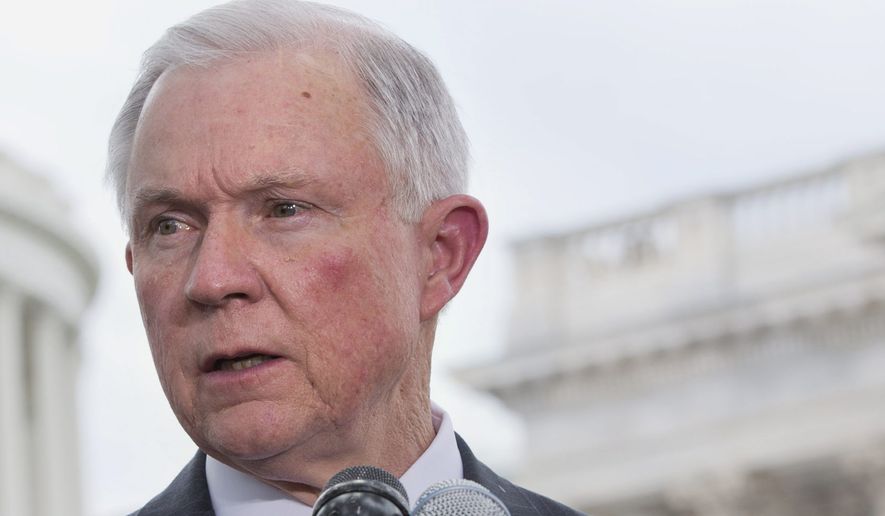Fearful of immigration’s power to sink any issue it touches, the administration and Republican leaders on Capitol Hill are doing everything they can to try to make the case that immigration is totally unrelated to the looming Pacific trade deal and the fast-track trade authority President Obama says will be needed to conclude the negotiations.
The assurances have made some headway, including swaying the chairman of the Senate Judiciary Committee, who said he now feels comfortable that the Obama administration won’t try to use the trade deal to make backdoor changes to immigration policy.
Not everyone is convinced. Sen. Jeff Sessions, an Alabama Republican who has led opposition to Mr. Obama’s immigration policy, told colleagues to seek “ironclad” guarantees that would rule out any leeway for either Mr. Obama or the next president to negotiate an immigration deal as part of the Pacific trade agreement.
Sen. Orrin G. Hatch, Utah Republican, chairman of the Finance Committee and the man who struck the key deal to advance fast-track powers for Mr. Obama, said he has received assurances from across the Obama administration that they won’t use the trade deal as a backdoor opening for immigration, but acknowledged that an element of trust is always involved.
“There’s an element of trust here, no question about that, and I expect the president to live up to it,” Mr. Hatch said. “He’s been working with us all the way through.”
Republican leaders are pushing to grant Mr. Obama fast-track powers, known as Trade Promotion Authority, to help him close the Asian trade deal, known as the Trans-Pacific Partnership, with more than 10 other countries.
The concern stems from a chapter of the Trans-Pacific Partnership relating to allowing temporary workers to enter the countries that are part of the deal. What exactly is in that chapter is up for debate because the current draft hasn’t been released.
The Obama administration insists that the provisions are merely transparency requirements that would require the countries in the trade agreement to make information on visa processing and temporary workers public.
But Mr. Sessions said Congress has been blindsided before by trade deals that turn into immigration-shaping policy, including in the 1990s, when guest-worker rules were negotiated as part of the General Agreement on Trade in Services.
“The real danger here is that before the ink is dry on TPA, and at any time during the life of TPA, any president can negotiate changes to the Trans-Pacific Partnership (TPP) and any other new agreement, and agree to changes in our immigration law,” Mr. Sessions wrote in a letter to colleagues urging them to demand changes to the fast-track bill.
The first week of action on trade went well for Mr. Obama and Republican leaders. The fast-track bill cleared the Senate committee easily, on a bipartisan 20-6 vote that suggested the makings of a coalition powerful enough to survive a filibuster. The House cleared its version through the Ways and Means Committee a day later on a 25-13 vote, with two Democrats joining Republicans.
Sen. Chuck Grassley, Iowa Republican, had an amendment to limit immigration teed up for the Finance Committee debate but didn’t end up pursuing his changes. He said he had his concerns satisfied by U.S. Trade Representative Michael Froman, who gave his assurances that the TPP didn’t envision substantive changes.
At a hearing this month Mr. Froman categorically denied any immigration talks.
“I can assure you that we are not negotiating anything in TPP that would require any modification of the U.S. immigration laws or system, any changes to our existing visa system,” Mr. Froman said. “And in fact, TPP will explicitly state that it will not require changes in any party’s immigration laws or procedures.”
Mr. Froman said the other Trans-Pacific Partnership countries are talking about boosting guest workers, but the U.S. “decided not to do so.”
But Rosemary Jenks, government relations manager for NumbersUSA, which lobbies for stricter immigration limits, said she spoke with lawmakers who have read the secret agreement and told her it specifically says it can be rewritten at any time — and that’s what scares them.
“The TPP is what they call a living agreement, and it specifically says this — it specifically says the provisions can be changed at any time by the agreement of the partnership countries, which means without the consent of Congress,” Ms. Jenks said.
That, she said, creates an opening Mr. Obama could use. Ms. Jenks said given his history on immigration and trying to work around Congress, lawmakers should anticipate he would try to do that.
“In order to believe that there will not be any immigration in TPP, you have to believe that Barack Obama is not going to use a free trade agreement to further his agenda,” Ms. Jenks said. “Maybe Sen. Grassley believes that, but I don’t.”
Republicans will have to provide the vast majority of votes in support of Trade Promotion Authority for it to clear Congress in the next few weeks and months. Concerns over immigration could dampen that support, though Ms. Jenks said the problems will come from more than immigration.
“I don’t know if immigration by itself will be a deal-killer for very many, but I know Republicans who go down and read the agreement who find all kinds of instances of Obama’s agenda that they oppose,” she said. “If members take the time to go and read the agreement, I think they’ll be very surprised and that will give them multiple reasons to oppose fast-track.”
• Stephen Dinan can be reached at sdinan@washingtontimes.com.




Please read our comment policy before commenting.